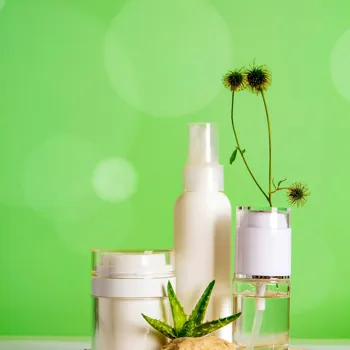Unravel the mysteries of skin sensitivity & choose gentle products. Dive into this guide for radiant, happy skin!
In the bustling world of beauty and skincare, finding the right products can feel like navigating
a maze, especially if you have sensitive skin. For many Indians, factors like climate, diet, and genetics play a significant role in determining skin sensitivity.

It's important to understand what causes your skin to react and how to choose products that will soothe and protect, rather than irritate. Don't worry, it's not as complicated as it seems once you get the hang of it!
This article delves into the nuances of sensitive skin, providing practical tips and guidance on building a gentle skincare routine. It's all about knowing your skin and making informed choices to keep it happy and healthy. So, let's get started on this journey to understanding your skin better.
Understanding sensitive skin: easily irritated by triggers, needs personalized care
First, let’s understand what sensitive skin actually means. It's not a medical diagnosis, but rather a term used to describe skin that is prone to irritation, redness, itching, or burning sensations. Imagine your skin as a delicate flower – easily affected by harsh winds and strong sunlight.

Similarly, sensitive skin reacts more readily to certain ingredients, environmental factors, or even stress. Common triggers include fragrances, artificial colors, harsh chemicals like sulfates (often found in soaps and shampoos), and certain preservatives.
Even seemingly harmless ingredients like essential oils can be problematic for some. The key is to identify your personal triggers through careful observation and experimentation. Keep a diary of products you use and note any reactions.
This will help you narrow down the culprits and avoid them in the future. Remember, what works for your friend might not work for you, as everyone’s skin is unique.
Choose gentle, fragrance-free products with calming ingredients for sensitive skin
Now that you know what can cause sensitivity, how do you find products that are gentle and kind to your skin? The first step is to become a label reader. Don’t just be swayed by fancy marketing claims. Look at the ingredient list and become familiar with common irritants.

Seek out products labeled "fragrance-free" rather than "unscented," as unscented products may still contain masking fragrances that can cause a reaction. Look for products with minimal ingredients. The fewer ingredients, the less likely you are to encounter a trigger.
Products containing calming ingredients like aloe vera, chamomile, oat extract, and green tea can be particularly beneficial. These ingredients have anti-inflammatory and soothing properties that can help to calm irritated skin.
Also, consider opting for products specifically formulated for sensitive skin. These products are often tested to ensure they are gentle and non-irritating.
Patch test new products to avoid skin irritation
Patch testing! Patch testing! Patch testing! This cannot be emphasized enough. Before applying any new product to your entire face or body, test it on a small, discreet area, such as the inside of your wrist or behind your ear. Apply a small amount of the product and wait for 24-48 hours.
If you experience any redness, itching, burning, or other signs of irritation, discontinue use immediately. If there is no reaction, it is likely safe to use the product on a larger area. This simple step can save you from a lot of discomfort and potential skin problems.
It’s especially important when trying new brands or products with unfamiliar ingredients. Think of it as a small insurance policy for your skin. Remember, patience is key. It may take some time to find the right products for your sensitive skin.
Don't get discouraged if the first few products you try don't work out. Keep experimenting and learning about your skin's unique needs.
Create a gentle skincare routine for healthy, protected skin
Building a gentle skincare routine is like creating a peaceful sanctuary for your skin. Start with a mild, soap-free cleanser. Avoid harsh scrubs or abrasive cleansers that can strip your skin of its natural oils. When cleansing, use lukewarm water, as hot water can further irritate sensitive skin.

Pat your skin dry gently with a soft towel, rather than rubbing. Follow with a fragrance-free moisturizer to help hydrate and protect your skin's barrier. Look for moisturizers containing ceramides, hyaluronic acid, or glycerin, which are known for their hydrating properties.
During the day, protect your skin from the sun with a broad-spectrum sunscreen with an SPF of 30 or higher. Choose a mineral-based sunscreen containing zinc oxide or titanium dioxide, as these are generally less irritating than chemical sunscreens.
Remember to reapply sunscreen every two hours, especially if you are spending time outdoors. Finally, keep your routine simple and consistent. Avoid using too many products at once, as this can overwhelm your skin.
Lifestyle impacts skin sensitivity; manage stress, diet, fabrics, and environment carefully
Beyond products, lifestyle factors also play a significant role in skin sensitivity. Stress can exacerbate skin conditions like eczema and rosacea, so find healthy ways to manage stress, such as yoga, meditation, or spending time in nature.
A balanced diet rich in fruits, vegetables, and whole grains can also help to improve skin health. Stay hydrated by drinking plenty of water throughout the day, as dehydration can make your skin more susceptible to irritation.
Certain fabrics, like wool or synthetic materials, can also irritate sensitive skin. Choose breathable fabrics like cotton or silk whenever possible. Avoid wearing tight-fitting clothing, as this can trap sweat and irritate the skin. Be mindful of environmental factors.
Pollution, smoke, and extreme temperatures can all trigger skin sensitivity. Protect your skin by wearing protective clothing, using air purifiers, and avoiding prolonged exposure to harsh weather conditions.
Remember that taking care of your overall health is just as important as using the right skincare products.
Managing sensitive skin: understand triggers, use gentle products, adopt healthy habits for radiant skin
In conclusion, managing sensitive skin requires a combination of understanding your skin's triggers, choosing gentle products, and adopting healthy lifestyle habits.

By becoming a savvy label reader, patch testing new products, and building a simple and consistent skincare routine, you can create a peaceful and healthy environment for your skin. Remember that everyone's skin is unique, so what works for one person may not work for another.
Be patient, experiment with different products, and listen to your skin's needs. With a little bit of knowledge and effort, you can achieve healthy, comfortable, and radiant skin, even if it's sensitive. So, go ahead, embrace your skin, and give it the care and attention it deserves.
You'll be amazed at the difference it makes!
AI Generated Content. Glance/InMobi shall have no liability for the content












